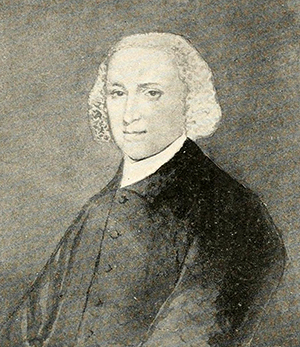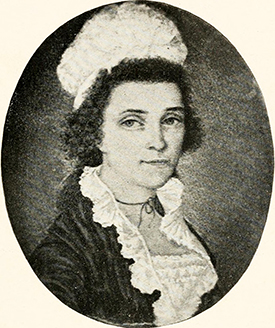1718–2 Oct. 1766

Jr. Jones, Robert ("Robin"), attorney general of North Carolina, legislator, and agent of Earl Granville, was born in Surry County, Va., the son of Robert Jones, who practiced law in Surry County and served in the House of Burgesses. Educated at Eton, Robin Jones returned to Virginia where he also practiced law in Surry County. A resident of Albemarle Parish, he was a close friend of William Willie (pronounced Wiley). Sometime between 1750 and 1753 Jones moved to Northampton County, N.C., where he built a large residence, The Castle, the exact location of which is unknown. A member of the Assembly from Northampton County from 1754 to 1761, Jones was a man of wide learning and culture who took an interest in the evolving court system of the province. As collector of quitrents in the Granville District for Earl Granville, he acquired vast tracts of land and was soon one of the largest landowners on the Roanoke River.
In 1756, on the recommendation of Governor Arthur Dobbs, Jones was appointed attorney general of the province. Soon after taking office, he became embroiled in the controversy surrounding the administration of the Granville District. In November 1758 several residents of the district, dissatisfied with the high fees and poor administration of its land office, appealed to Jones to petition the Assembly on their behalf for redress. The Assembly ordered an investigation, and a committee concluded that both Francis Corbin and Joshua Bodley had generally followed Granville's instructions in the management of the land office. Corbin, it was determined, had been engaged in questionable practices, but the Assembly was satisfied with Bodley's conduct. The only immediate result of the investigation was the publication of the schedule of fees charged by Granville's agents.
The petitioners were not mollified, however, and, soon after the new year, the smoldering anger of the farmers in the district erupted in violence. On 24 Jan. 1759 a posse of embattled and intoxicated farmers led by Colonel Alexander McCulloch kidnapped Francis Corbin in Edenton and took him to Enfield, where he and Joshua Bodley were held captive and forced to give bond for the reformation of the Proprietary land office.
Many of the disaffected yeomen were especially hostile towards the eloquent and elegant Robin Jones. Following his 1756 appointment as attorney general, Jones earned the enmity of the Granville "courthouse ring" because of his identification with Governor Dobbs's removal from office of Robert Harris, a Granville justice who had openly expressed contempt for the governor. In retaliation, the Granville justices often refused to hold court. Pursuant to his duties as attorney general, Jones reported these actions to Dobbs who followed Jones's recommendations in making his next appointments of Granville justices, much to the displeasure of those already sitting.
On 23 Mar. 1759, "The Petition of Reuben Searcy and Others" was presented to the county court of Granville and read in the presence of the justices. In this document, representing the views of "Sundry of the Inhabitants" of the county, "that Eloquent Gentleman" Robin Jones was accused of taking exorbitant legal fees, of preventing the appointment of justices of the peace favored by the petitioners, and "through his wiles and false insinuations to which art and chicanerie he owes his great success and high preferment in this Province" of imposing on "the inferior class of mankind" and on Governor Dobbs. The petitioners asked that Jones be prohibited from pleading at the Granville bar. Nothing directly resulted from the petition, but on 14 May Jones testified under oath before the governor and Council that "he had heared that it was intended by a great number of rioters to petition the court at Granville to silence him . . . and that if no such order was made, to pull him by the nose and also to abuse the court." Following a formal address to the governor by the Assembly on 15 May, a proclamation was issued and several rioters were jailed. During disorders in Enfield, farmers from surrounding counties broke into the jail and the prisoners escaped.

Meanwhile, after the disturbances, Francis Corbin had failed to bring the ringleaders to justice, and in England, as a result of the disorders and mismanagement of the land office, Thomas Child had persuaded Earl Granville to remove Corbin and Bodley from office. In September Child returned to North Carolina as the new attorney general, replacing Jones who then became Proprietary collector of quitrents for the district during the next year, when Child reformed many of the practices of the land office.
In the Assembly during 1760 and 1761 Jones was allied with Thomas Child, Thomas Barker from Edenton, and Francis Corbin, newly elected from Chowan County, in supporting the political and economic interests of the northern counties and in opposing the administration of Arthur Dobbs. Governor Dobbs denounced the group as "the northern Junto," in part reflecting his particular dislike of Child. Nevertheless, in July 1761 Jones once more received a commission from the governor as attorney general. Child, who was moving to Suffolk, Va., had recommended Jones as his successor, and in August 1761 he left active management of Proprietary affairs in Jones's hands. Jones also continued to serve as collector of Proprietary quitrents until the land office was closed in 1765.
During the next several years disorders continued sporadically in Granville and elsewhere, leading eventually to the August 1766 mass meeting at Sandy Creek, Orange County, where Regulator Advertisement Number 1 appeared. Jones may well have learned of the meeting, but in the summer of 1766 he was confined to his bed. On 20 August Samuel Johnston wrote to Thomas Barker in London, "your old friend R. J. is I am told on his last leggs." Johnston promised to visit Jones and to provide Barker with an account of his business affairs and Jones's health. When Johnston arrived in Halifax to settle with Jones for some monies received for land, he found Jones "so low as to be quite incapable of transacting that or any other business." According to Johnston, Jones "continued in that condition till about the middle of Sept. when a mortification was begun in his ankle and his surgeons at his request thought it proper to take off the limb above his knee. He underwent the operation with great firmness but survived it only a few days." Thus Jones did not serve in the 1766 Assembly to which he had been elected.
As late as 1773, Jones's role in the Granville disorders was criticized in the Virginia Gazette in Williamsburg. Willie Jones was loyal to his father's memory, and his published reply was characteristically blunt: "You, sir, are a liar."
Unlike the will of his freethinking son, Willie, which reflected an acerbic disbelief, Robin Jones's will, dated 4 Apr. 1764, in which he left his considerable property to his wife and children, exhibited the pious standard form language of the time. Father and son did, however, share an aversion to mournful funerals. Robin Jones directed that no one go into mourning on his death, and that his funeral be "decent without any pomp according to . . . the Church of England & that on the occasion a few friends only . . . be assembled to attend my obsequies." In leaving Mary Eaton Jones a life estate in his Occoneechee Neck plantation, Jones berated his second wife, stating that "her conduct has been so void of the duties enjoined by the conjugal estate & the injuries she has done me so many & so great that I am conscious this provision far exceeds her merit."

In 1737 or 1738 Jones married Sarah Cobb of York County, Va., the daughter of Robert and Elizabeth Allen Cobb. They became the parents of five children: Allen (b. 24 Dec. 1739), Willie (b. 25 May 1741), Martha (b. 22 Aug. 1743), Charlotte (b. 7 Sept. 1746), and Robert (b. 2 Feb. 1749). After the death of his first wife, Jones married Mary ("Molly") Eaton, by whom he had one daughter, Elizabeth (b. 13 June 1766).
Robin Jones was connected by descent and marriage to some of the most influential members of the colonial Halifax circle. His oldest son was the Federalist general Allen Jones of Mount Gallant, whose daughter Sarah married Governor William R. Davie. A younger son, Willie Jones of The Grove, was an enigmatic Jeffersonian, whose daughters included Sally, who married Governor Hutchins G. Burton, and Martha Burke ("Patsy"), who married John Wayles Eppes of Buckingham County, Va., whose first wife had been Maria Jefferson. Robin Jones's daughter, Martha, married Dr. Thomas Gilchrist and their daughter married Colonel William Polk. Jones's youngest child, Elizabeth, married Jeffersonian Benjamin Williams, twice governor of North Carolina, who in 1799 ironically succeeded in office his wife's niece's Federalist husband, William R. Davie.